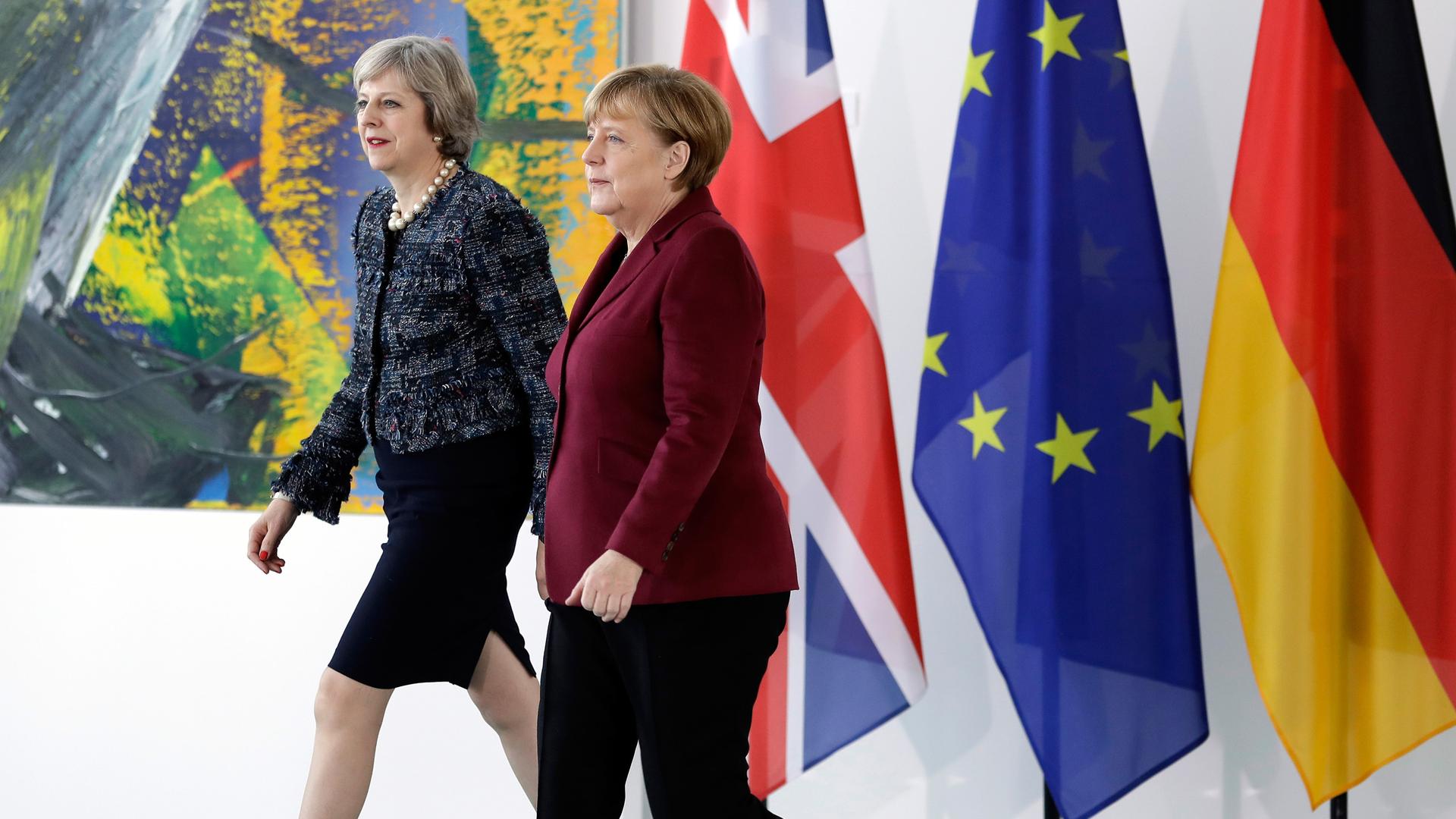Brexit looms for more than 100,000 Brits living in Germany
German Chancellor Angela Merkel and Britain's Prime Minister Theresa May arrive for a statement prior to a meeting at the chancellery in Berlin, Germany, November 18, 2016.
The Brexit debate in the UK is focusing on the rights of EU migrants in the country, among them about 300,000 Germans. Many people are worried about what will happen to them after Brexit. But how are the 100,000 Brits in Germany feeling?
"So, when are you becoming German?" It's one of those questions that always seems to crop up when I'm chatting to British friends here in Berlin these days. Most are either applying for German citizenship or counting the days until they've spent enough time here to be eligible.
That's because no-one knows what will happen to them once Britain leaves the EU. These are not the bronzed "expats" of the tabloid imagination — living it up in the sun, glass of gin in one hand, golf club in the other. They are young freelancers worried that if they need visas their work will dry up. Or pensioners living in rented flats, surviving on fixed incomes tied to a shrinking pound.
Esme was the most organised of any of us. She made her first appointment with the German authorities the week before the referendum. She took the citizenship test, submitted all the documents, and a few weeks ago became German in a ceremony in her local town hall, in the Berlin district of Neukoelln.
What surprised her was how emotional she felt about it. About 50 people, of 22 different nationalities were being granted German citizenship: Syrians, Americans, Iraqis, Turks, Italians, French — even a few other Brits.
The local mayor gave a speech welcoming everyone, and reflected on the meaning of Heimat, or homeland. And as she quoted from the German constitution, and talked about how all people were equal, regardless of gender, origin or ethnicity, Esme felt tears in her eyes.
A cellist and a pianist played the 22 different national anthems of those present — by then, Esme was almost sobbing. And finally a singer came in to give a moving rendition of the European anthem, Beethoven's Ode to Joy — by which time Esme was in pieces.
Not bad for an out-and-out liberal, who's usually pretty skeptical about flag-waving.
"It was the thought of the journeys that everyone had taken to get here," Esme explained to me afterwards. "The wars that people had escaped from. And the efforts they had made to start a new life in Germany." Some people had learned, by heart, the declaration of allegiance to the German constitution, especially for the ceremony. Esme said it put her own worries into perspective.
For Esme, and I suspect for a lot of the Brits who are now becoming German, what started out as a practical decision about visas and passports, is unexpectedly raising deeper questions about identity. Can you really be both German and British? And what does it mean to be German anyway?
Not so very long ago, saying to other Brits that you're becoming German would almost inevitably lead to some tired gag about Nazis or towels on sun loungers. And although some British headlines might still use those cliches — and you can expect a few more if Brexit talks get nasty — today, modern Germany is seen more often as a bastion of tolerant values: international, democratic and open to immigrants.
Of course, there are people outside and inside Germany who criticize Angela Merkel's decision to allow so many foreigners in. But for those new British-Germans, themselves migrants, a country that welcomes foreigners is attractive.
In fact, being a German with a hyphen is a relatively new concept here. Traditionally German identity was an ethnic idea, related to bloodline rather than where you were born. So it used to feel as if Britain and America were rather better at accepting that people had layered identities — enabling you to be originally from one country, but a citizen of another.
But over the past few decades Germany has been going through a difficult, and largely successful, process of redefining what it means to be German. Angela Merkel now refers to Germany as "a country of immigration" — an unimaginable statement for a center-right chancellor until very recently. And today 20 percent of Germans are described as having a migrant background.
Brexit-Britain and Trump's US, meanwhile, seem to be heading in the opposite direction. At least, that's what it looks like from here.
As for me, my own citizenship status is a bureaucratic muddle. It's no doubt my own fault for moving around too much, but growing up in a globalizing world I had thought passports, borders and notions of citizenship were losing their importance.
Today though, as I scrabble together previously unheard of documents to avoid suddenly becoming an illegal alien, I can see I was wrong.
This story was first published by BBC Magazine.
